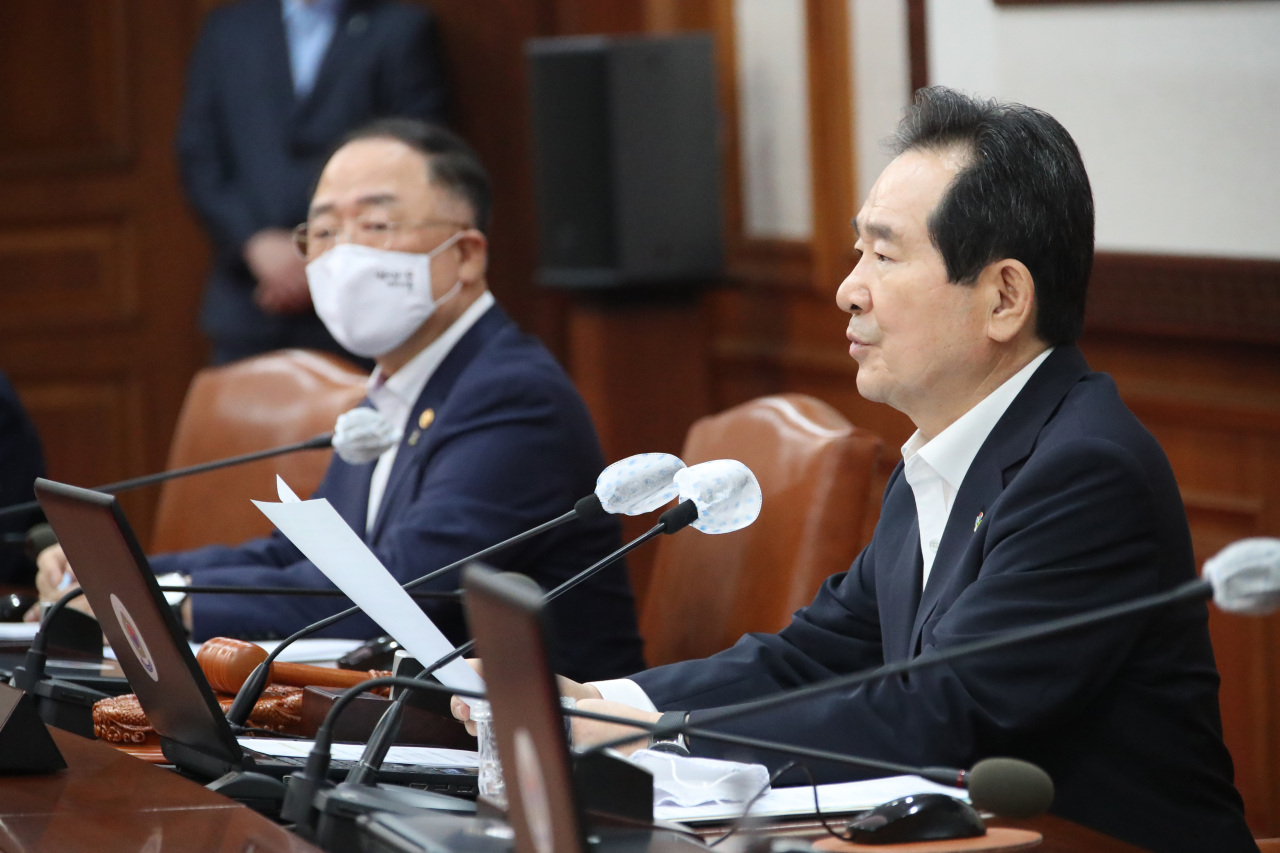South Korea has finalized the single-largest supplementary budget worth 35.3 trillion won ($29 billion), marking its third set of extra fiscal spending in the face of the COVID-19 pandemic, the Ministry of Economy and Finance said Wednesday.
The supplementary budget bill was approved in an extraordinary Cabinet meeting held at Seoul Government Complex to overcome the economic crisis and brace for the forthcoming post-coronavirus era. It is slated to be submitted to the National Assembly on Thursday.
This is the third extra budget bill so far this year and the sixth since the Moon Jae-in administration took office in 2017. It is also the first time since 1972 that Seoul has drafted more than three sets of extra budgets in a single year.
The suggested amount surpasses the previous extra budgets. The country had approved a 28.4 trillion won extra budget in 2009 under the impact of the global financial crisis and 13.9 trillion won in 1998, shortly after the Asian financial crisis.
The ministry’s plan is to procure 10.1 trillion won through expenditure restructuring, 1.4 trillion won from surplus funds, and 23.8 trillion won by issuing deficit-covering bonds.
Combined with the two previous extra budgets worth 24 trillion won, the latest budget plan is expected to expand the country’s emergency fiscal injection by almost 60 trillion won during the first half of the year and its national debt by around 100 trillion won from a year earlier.
“The biggest goal of this extra budget is to overcome the economic crisis triggered by the COVID-19 pandemic,” Deputy Prime Minister and Finance Minister Hong Nam-ki had said in a press briefing last week.
“It will provide liquidity to companies and small business operators, and help them deal with the employment market shock, and brace for the upcoming economic recovery.”
The fiscal resources will also lay the foundation for the government’s so-called “Korean New Deal” plan to invest 76 trillion won over the next five years into digital and green industries in order to promote sustainable growth, according to the fiscal chief.
Reflecting the incumbent crisis in the nation’s employment indexes, the latest extra budget allocates 8.9 trillion won for job market stabilizing actions.
Of the amount, 3.6 trillion won will be spent on creating 550,000 or more new jobs, 3.5 trillion won on expanding unemployment allowances, 900 billion won on subsidies for companies that maintain employment, and 600 billion won on emergency employment funds.
Seeking to boost private consumption, the government will provide 168.4 billion won worth of discount coupons and an extra 3 trillion won in municipal local vouchers.
In a move to induce capital, it will also create a subsidy fund for Korean companies that relocate their manufacturing facilities back home.
Addressing the continued epidemic crisis, Seoul will provide 400 billion won for cash-strapped private medical facilities, 200.9 billion won for purchasing medical protective gear, and 30 billion won to expand the number of negative pressure rooms.
Such expansionary fiscal spending, if approved by the parliament, will raise the national debt to gross domestic product ratio to 43.5 percent.
Addressing the related concerns, Prime Minister Chung Sye-kyun underlined the need for immediate fiscal actions, citing the current crisis as a “wartime situation.”
Fiscal chief Hong also claimed that a certain level of fiscal soundness aggravation should be accepted.
“The third extra budget will increase national debt but, this is necessary to promote growth and recover fiscal soundness within a short period of time,” he said.
On growing concerns that the mass issuance of deficit-covering bonds may heighten the commercial interest rate, Hong said that the central bank’s easing actions will partly offset such side effects.
Last month, the Bank of Korea cut the base interest rate to a fresh record-low of 0.5 percent, while lowering its outlook for this year’s economic growth to minus 0.2 percent, down drastically from the previously suggested 2.1 percent.
By Bae Hyun-jung (
tellme@heraldcorp.com)








![[Today’s K-pop] Blackpink’s Jennie, Lisa invited to Coachella as solo acts](http://res.heraldm.com/phpwas/restmb_idxmake.php?idx=644&simg=/content/image/2024/11/21/20241121050099_0.jpg)